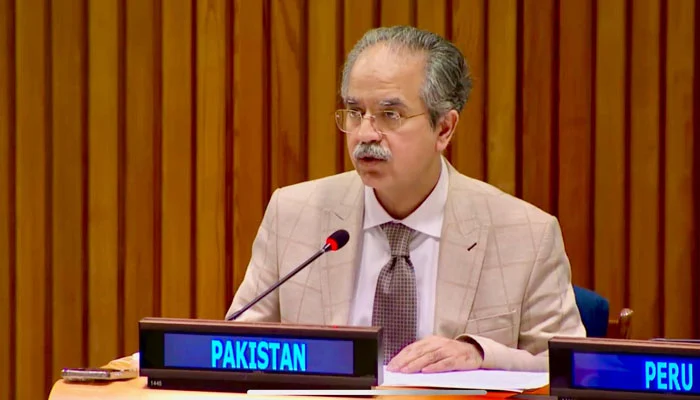
At UNSC, Islamabad Renews Push for Diplomacy on Iran Nuclear Issue
Pakistan Advocates Dialogue Over Confrontation
At the United Nations Security Council (UNSC), Pakistan renewed its call for diplomacy and peaceful negotiations regarding Iran’s nuclear program, urging world powers to avoid escalation and seek consensus through dialogue. As a non-permanent member of the UNSC for the 2025–26 term, Islamabad used its platform to highlight the importance of multilateralism in resolving sensitive nuclear issues.
Speaking at the UNSC headquarters in New York, Pakistan’s Deputy Prime Minister and Foreign Minister, Senator Ishaq Dar, emphasized that diplomacy must prevail over force. He stressed the urgent need to uphold the UN Charter and international law, particularly in matters involving nuclear proliferation and regional peace.
Support for the JCPOA Framework
Pakistan reiterated its support for the Joint Comprehensive Plan of Action (JCPOA), commonly known as the Iran nuclear deal, which was signed in 2015 between Iran and major world powers. Islamabad urged all stakeholders to return to the agreement’s framework and restore mutual trust through transparent verification and dialogue.
The JCPOA, though weakened in recent years by U.S. withdrawal and Iranian countermeasures, remains the only viable platform for curbing nuclear ambitions while ensuring Iran’s right to peaceful nuclear energy. Pakistan underscored the significance of the International Atomic Energy Agency (IAEA) in verifying compliance, while urging both Iran and the West to exercise restraint.
Bilateral Engagement with Iran
Pakistan’s position at the UNSC follows a series of high-level exchanges with Iran in recent months. Pakistani leadership, including Prime Minister Shehbaz Sharif and Foreign Minister Ishaq Dar, has consistently expressed support for Iran’s right to peaceful nuclear technology under international supervision.
The two neighbors have also strengthened regional cooperation through diplomatic and economic dialogue. Islamabad noted that regional peace and stability are interlinked with constructive engagement with Iran, especially given the shared border and deep cultural and economic ties.
Concerns Over Use of Force
Addressing the global community, Pakistan warned against the use or threat of force in resolving disputes related to Iran’s nuclear program. Islamabad made it clear that unilateral military actions would only worsen tensions and further destabilize the already volatile Middle East.
Referring to past incidents involving threats to Iranian nuclear sites, Pakistani diplomats reiterated that peaceful settlement of disputes is the only viable option. They called on all UNSC members, especially the permanent five, to fulfill their responsibilities in promoting peace and security rather than endorsing confrontation.
Multilateral Diplomacy as a Priority
Pakistan’s renewed push for diplomacy at the UNSC is part of a broader foreign policy agenda focused on multilateralism and conflict resolution. Islamabad highlighted that its diplomatic vision is grounded in international cooperation, mutual respect, and non-interference.
Foreign Minister Dar affirmed Pakistan’s commitment to playing a constructive role in all international forums where nuclear security, disarmament, and non-proliferation are discussed. He further emphasized the importance of inclusive dialogue involving regional stakeholders to avoid miscalculations and encourage long-term solutions.
Linking Regional Stability to Global Peace
During its UNSC engagement, Pakistan also drew attention to the interconnected nature of regional conflicts. Citing the example of tensions in South Asia, including the situation in Jammu and Kashmir, Islamabad stressed that unresolved regional disputes can fuel broader instability, including nuclear concerns.
Pakistan called for consistent global standards in addressing nuclear issues, emphasizing that selective application of international norms undermines the credibility of global institutions. The delegation urged the UNSC to adopt a balanced approach and avoid double standards when dealing with nuclear matters in different regions.
Call for Revival of Confidence-Building Measures
Islamabad advocated the revival of confidence-building measures (CBMs) between Iran and Western powers to de-escalate tensions. These measures, Pakistan suggested, could include reopening diplomatic channels, restoring economic cooperation, and allowing IAEA inspections to proceed unhindered.
Pakistan’s proactive stance at the UNSC reflects its belief that sustainable peace can only be achieved through dialogue, mutual compromise, and adherence to international norms. By renewing its support for diplomacy, Islamabad positioned itself as a responsible stakeholder advocating for non-proliferation, regional stability, and global peace.







